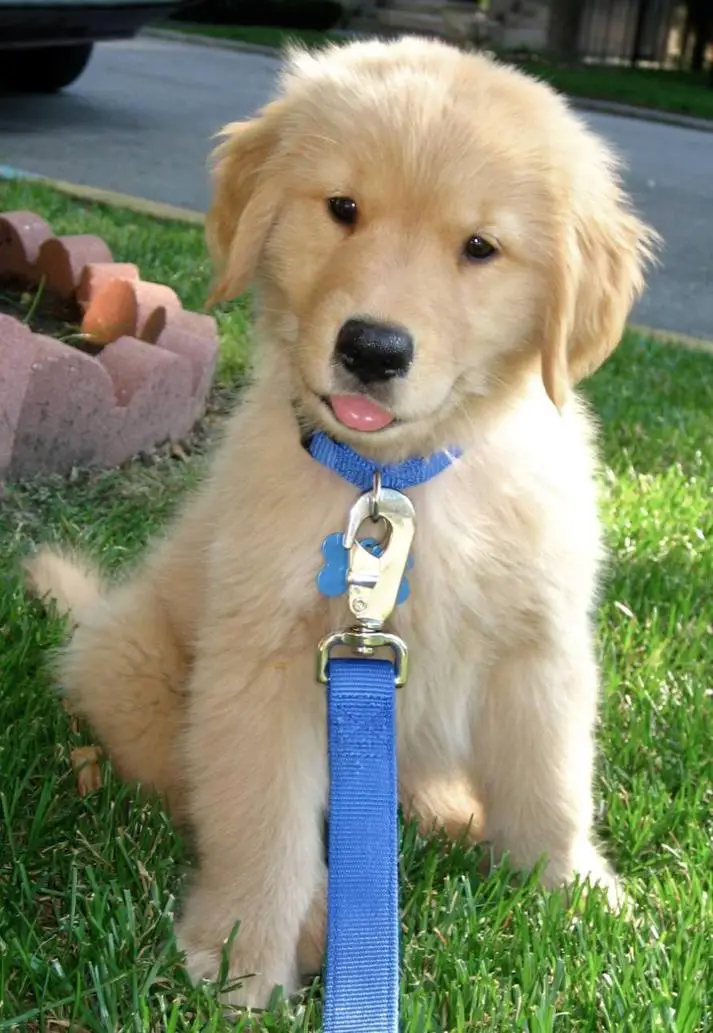When Do Golden Retriever Puppies Stop Biting?
As a proud owner of a Golden Retriever puppy, you may have experienced the frustration of constant nipping and biting. But don’t worry, you’re not alone! One of the most common questions among new puppy owners is “when do Golden Retriever puppies stop biting?”
Understanding Puppy Biting Behavior is the first step towards tackling this issue. Puppies explore their surroundings through their mouths and use biting as a way to play and interact. However, it can become a problem as their sharp teeth can cause painful injuries.
When addressing this behavior, it’s essential to use positive Training Techniques to Discourage Biting. Establishing Consistent Rules and Boundaries can also help your puppy understand what is and isn’t acceptable.
It’s important to keep in mind that teething can also contribute to biting behavior during the Puppy Teething Phase. Learn how to manage this phase and provide appropriate chew toys to alleviate discomfort.
Finally, don’t forget the power of Positive Reinforcement for Non-Biting Behavior. Celebrate your furry friend’s achievements and reward them for good behavior. However, When to Seek Professional Help for Biting Issues is also an option if the problem persists.
Stay tuned for more tips on how to raise a happy and healthy Golden Retriever!

Understanding Puppy Biting Behavior
Puppies, just like human babies, explore the world with their mouths. Therefore, biting is a common behavior among pups. However, it’s essential to identify the difference between play biting and aggressive biting. Play biting is harmless and usually happens during playtime, while aggressive biting can cause harm and requires immediate action.
Additionally, puppies tend to bite more during teething, which usually happens between three to six months of age. This is because their teeth are growing, and they feel the need to chew on something to soothe irritation. However, it’s important to teach puppies that biting is not an acceptable behavior.
Understanding puppy biting behavior is crucial in reducing the likelihood of aggressive biting and preventing possible harm to pet owners, children, and other animals. As a pet owner, it’s important to establish consistent rules and boundaries, provide positive reinforcement for non-biting behavior, and seek professional help if necessary.
Training Techniques to Discourage Biting
One of the most challenging aspects of raising a Golden Retriever puppy is managing their biting behavior. While biting is a natural puppy behavior that helps them explore the world around them, it can be frustrating and painful for their owners.
Fortunately, there are several techniques you can use to discourage your puppy from biting. One of the most effective ways to do this is by redirecting their attention to a toy or chew bone when they start to nip. Providing your puppy with appropriate chew toys can satisfy their urge to bite and teach them what is acceptable to chew on.
You can also try using a firm “no” or “stop” command when your puppy starts biting and then walk away from them for a few minutes. This teaches them that biting results in the end of their playtime and helps discourage them from continuing the behavior.
Consistency is key when it comes to training your puppy not to bite. You should also avoid any physical punishment, as this can make them anxious and fearful. Instead, focus on positive reinforcement by rewarding them with praise and treats when they exhibit non-biting behavior.
By using these techniques consistently and with patience, you can help your Golden Retriever puppy learn appropriate chewing behavior and prevail over their biting habits.
Puppy Teething Phase and Biting
As a Golden Retriever puppy goes through the teething phase, their need to chew and bite increases. This is a natural behavior for puppies and is their way of exploring their environment and relieving the discomfort of teething.
It’s important to provide appropriate chew toys to redirect their biting behavior and ensure they don’t damage your belongings. The teething phase typically lasts until their adult teeth come in, which is around six months of age.
During this time, consistent training and positive reinforcement can also help discourage unwanted biting behaviors.
Establishing Consistent Rules and Boundaries
Establishing consistent rules and boundaries is crucial for stopping your Golden Retriever puppy from biting. Puppies need to know what is acceptable behavior and what is not. Consistent rules and boundaries help them understand the difference between right and wrong behavior.
Setting boundaries means communicating with your puppy what they should or should not do. For instance, a common boundary is not biting during playtime. To establish this rule, you need to enforce it consistently. Don’t allow biting during playtime, but encourage other behaviors such as licking or sniffing.
Consistency is key in establishing rules and boundaries. Always enforce the same behavior, even when different people are playing with your puppy. Your Golden Retriever puppy will be more likely to learn than when he is exposed to different standards of behavior.
In addition, consider using positive reinforcement when your puppy follows rules correctly. Praising good behavior with treats, playtime, or praise will encourage your Golden Retriever puppy to continue with good behavior.
Setting consistent rules and boundaries may take time, and you may need to be patient, but with time, consistency, and positive reinforcement, you can train your Golden Retriever puppy to stop biting.
Positive Reinforcement for Non-Biting Behavior
Positive reinforcement is a highly effective method for teaching your Golden Retriever pup to avoid biting. Essentially, it involves rewarding your puppy with treats or plenty of love and attention when they exhibit non-biting behavior. This teaches your puppy that good behavior is beneficial, rather than negative reinforcement, which can actually encourage biting or other destructive behavior in the long term.
Positive reinforcement also reinforces trust between you and your pup, which is crucial for building a strong bond. When your pup behaves well, take the time to show them affection and give them the attention they crave. Make sure you’re consistent with your reinforcement techniques, and don’t forget that positive reinforcement can be used in tandem with other training techniques to create a well-rounded, disciplined, and happy pup.
When to Seek Professional Help for Biting Issues
While puppy biting during teething phase is normal, excessive biting can be a cause for concern. If training techniques and positive reinforcement do not seem to be effective in reducing biting behavior or if the biting is aggressive and causes injury, it may be time to consider seeking professional help.
A professional dog trainer or behaviorist can assess the underlying causes of the biting and develop a customized plan to address the behavior. They may also provide guidance on managing the biting while the training takes place. Remember, seeking professional help early on can prevent the behavior from escalating and ensure a happy and safe relationship with your furry companion.
Conclusion
In conclusion, understanding why your golden retriever puppy bites and how to train and establish consistent rules and boundaries will aid in curbing biting behavior. Remember, puppy biting is a normal phase during teething, and positive reinforcement for non-biting behavior can help during this time. Seeking professional help for biting issues may also be necessary, but it’s important to work through training techniques to discourage biting first. Just as with any other type of behavior, consistency and patience are key. With time and effort, you can help your golden retriever puppy stop biting and become a well-behaved family member. So enjoy the journey with your furry friend and soon enough, the biting phase will be a thing of the past.



